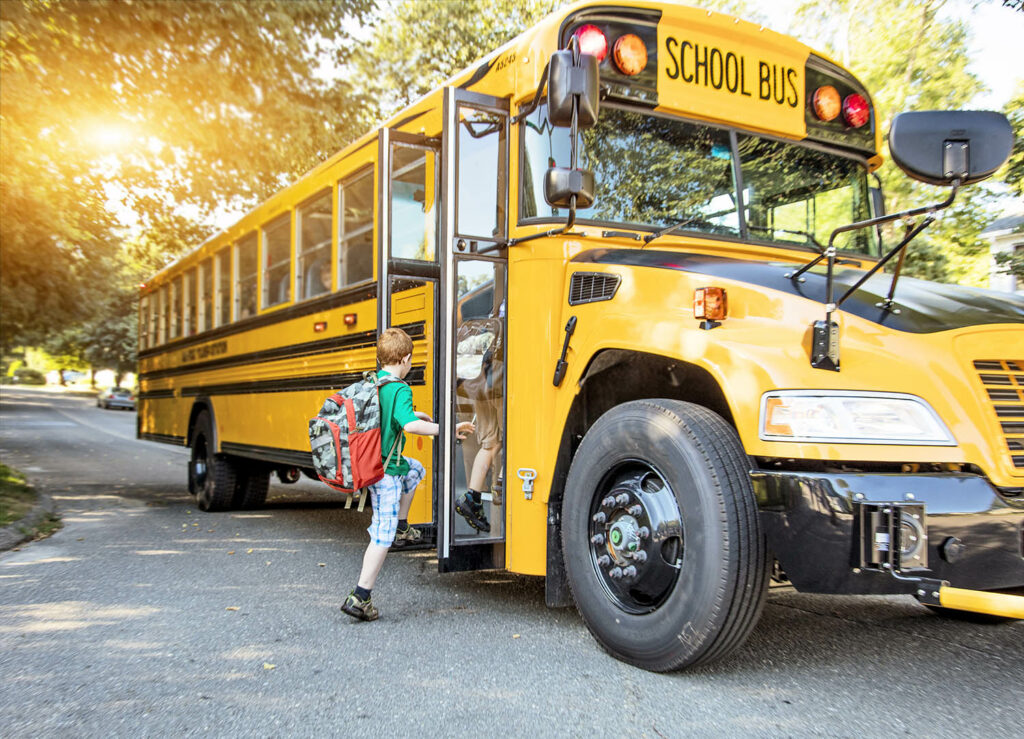With the Bipartisan Infrastructure Law (BIL)’s historic investment in electric vehicles (EVs), we now have 7.5 billion reasons to shift to e-mobility, but we need only one reason: global warming.
Still heavily reliant on fossil fuels, the transportation sector generates more than a quarter of America’s greenhouse gases, underscoring the importance of EVs. Through the BIL, states and equivalent entities can access $7.5 billion to construct a national network of 500,000 EV charging stations. Of this amount, the Federal Highway Administration (FHWA) administers $5 billion to the National Electric Vehicle Infrastructure (NEVI) Formula Program and $2.5 billion to the Charging and Fueling Infrastructure (CFI) Discretionary Grant Program.
Additionally, state, local, and tribal entities, eligible contractors, and nonprofits can access $5 billion to replace aging school buses with newer, cleaner models under the Environmental Protection Agency (EPA)’s new Clean School Bus (CSB) Program. All three programs will help states lower maintenance costs, create domestic manufacturing jobs, and reduce emissions that exacerbate climate change. Below, we will explain FHWA’s NEVI and CFI programs, EPA’s CSB Program, and states’ prospects and challenges to fleet electrification.
Reimagining the “Great American Road Trip”
FHWA approved all state, district, and territory plans for Fiscal Years 2022 and 2023 to unlock $1.5 billion of the total $5 billion in NEVI Formula funding to build EV charging stations along 75,000 miles of highway. Today, state departments of transportation across the nation are beginning to implement their plans in support of President Biden’s long-term goal: cut emissions 50% below 2005 levels by 2030.
Effective today (March 30, 2023), FHWA issued minimum criteria to standardize all NEVI-funded charging stations so that EV owners can charge their vehicles in any state regardless of vehicle brand. Reimbursable activities include upgrades to and construction of EV charging infrastructure; operations and maintenance (O&M) of charging stations; stakeholder engagement; workforce development; and data mapping and analytics. State departments of transportation will procure these activities from prospective contractors and establish appropriate deployment timelines.
Building on the NEVI Formula Program, FHWA opened the first round of applications for the CFI Discretionary Grant Program on March 14, 2023. Up to $700 million was opened to a variety of applicants including, but not limited to, states, metropolitan planning organizations, local governments, public authorities with transportation functions, and tribes. The CFI program will support the strategic deployment of EV charging or alternative-fueling infrastructure projects in communities nationwide and along designated corridors.
NEVI and CFI grant awardees must provide at least 20% of their individual project costs as a matching share, which can be financed through public-private partnerships (i.e., collaborations between government agencies and private companies). As private-sector shareholders and stakeholders are expecting increased environmental transparency and performance, public-private partnerships can enable private companies to not only participate in the EV conversation, but also improve their reporting, financial metrics, and green brand equity.
The NEVI and CFI programs are targeting those disproportionately affected by air pollution through the installation of EV charging stations in rural, low-income, and moderate-income neighborhoods, increasing access to alternative fuels and moving the needle on environmental justice.
Yellow School Buses Go Green
Every day, 25 million American children board buses powered by diesel fuel, which emit toxic air pollutants such as particulate matter and nitrogen oxides. Because children have underdeveloped lungs and higher breathing rates, they are more susceptible to the effects of diesel exhaust, raising their risk of developing asthma or other respiratory illnesses. The BIL is committing an unprecedented $5 billion to EPA to replace school bus fleets with low- and zero-emission models, thereby reducing pipeline pollution and providing cleaner air for students, bus drivers, school staff, and neighborhoods.
CSBs also cost less to fuel and maintain than diesel school buses, freeing up essential resources for low-income, rural, and Tribal school districts. To prioritize disadvantaged communities, EPA created educational initiatives and partnered with stakeholders to raise awareness of available grants and rebates under the CSB Program. As a result of extensive outreach, including public webinars, informational flyers, and a dedicated mailbox for feedback, the agency received an overwhelmingly positive response to the rebate program, ultimately distributing awards to over 400 applicants for bus replacement and charging or fueling infrastructure.
These awards represent the initial $1 billion of the 5-year, $5 billion CSB Program. In the coming months, EPA will be launching a grant and rebate competition, allocating an additional $1 billion to CSBs during Fiscal Year 2023. EPA encourages all those who did not receive an award in the first round of the program, as well as those who have not applied yet, to join upcoming funding cycles to aid in the nationwide transition to CSBs.
Navigating Funding Opportunities and Accelerating the EV Transition
The EV transition for commercial and industrial use is gaining momentum rapidly, with EV sales in the United States increasing by 65% last year. Through BIL financing and incentives, state and local governments have been tasked with building out their EV charging infrastructure to meet this growing demand. Those who have yet to begin the EV transition must first assemble a team to vet applications and decide how to electrify their own fleets as well as aid local municipalities. Fleet electrification will eliminate the need for underground and aboveground storage tanks, cutting maintenance costs and unplanned downtime as a result of spills, leaks, and regulatory non-compliance.
Deployment of EV charging infrastructure presents states with a unique opportunity to grow and modernize their workforce, achieve sustainability objectives, such as decreasing emissions from the transportation industry, and cultivate ingenuity through research and development of new EV charging technologies. By participating in the NEVI, CFI, and CSB Programs, states can roll out EV charging infrastructure to encourage the adoption of EVs, thus paving the way for a more promising future.
Helping Our Clients Spark the EV Revolution
It isn’t hard to envision an electric future when grant recipients are backed by an industry leader with broad reach across all markets. At Weston, we are committed to helping state DOTs secure funding from the NEVI, CFI, and CSB Programs. We make it possible for our clients to maximize federal grant opportunities for EV charging infrastructure projects, which is why we are actively pursuing related statewide initiatives.
Our expertise in alternative fuels and EV charging, in tandem with our direct access to a variety of EV charging manufacturers/software providers, allows us to provide turnkey services, from grant application support to design and construction to O&M. Weston understands that EV owners need reliable access to charging stations—if we build them, EV owners will come. With a technology- and brand-agnostic approach, we strive to bring in the right partners to meet the needs of our clients and EV owners. In short, Weston makes it easy.
References
EPA. 2023. “Clean School Bus (CSB) Reports to Congress.” Www.epa.gov. January 25, 2023. https://www.epa.gov/cleanschoolbus/clean-school-bus-csb-reports-congress.
Help us shorten the road to e-mobility!
FHWA. 2023. “National Electric Vehicle Infrastructure Standards and Requirements.” Www.federalregister.gov. February 28, 2023. https://www.federalregister.gov/documents/2023/02/28/2023-03500/national-electric-vehicle-infrastructure-standards-and-requirements.
“First Round of Funding Announced for Charging and Fueling Infrastructure Discretionary Grant Program.” n.d. Energy.gov. Accessed March 24, 2023. https://www.energy.gov/eere/fuelcells/articles/first-round-funding-announced-charging-and-fueling-infrastructure
“New Car Sales Fell in 2022, but New Electric Car Sales Rose Dramatically.” 2023. Kelley Blue Book. January 17, 2023. https://www.kbb.com/car-news/new-car-sales-fell-in-2022-but-new-electric-car-sales-rose-dramatically/#:~:text=But%20electric%20vehicle%20(EV)%20sales.


